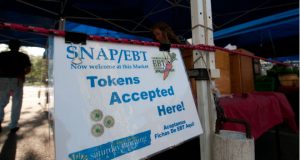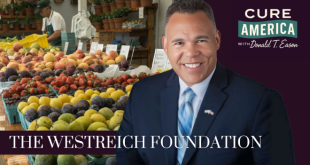 The Trump administration proposed a way to save billions of dollars over 10 years.
The Trump administration proposed a way to save billions of dollars over 10 years.
In lieu of part of their benefits, families who receive $90 or more under the Supplemental Nutrition Assistance Program (SNAP) each would receive a box of non-perishable food every month.
The boxes, which have been compared to food delivery services like Blue Apron, would contain shelf-stable items like milk and juices, ready-to-eat cereals, and canned meat and vegetables. Called “America’s Harvest Box,” the retooled program purportedly would save money and provide more nutritious food. (It could also reduce food-stamp fraud, where recipients trade EBT cards for cash.)
The American Enterprise Institute reported that the Bipartisan Policy Center created a SNAP Task Force, which recommended ways to improve the program and promote better nutrition for recipients. An excerpt (emphasis added):
Medicaid and SNAP both provide resources to low-income households to support healthy lifestyles. But the latter actively undermines the former.
Our task force developed 15 recommendations aimed at better promoting good nutrition through SNAP. Recommendations focused on prioritizing nutrition in SNAP, strengthening nutrition education in SNAP, better aligning Medicaid and SNAP, and better coordinating state and federal nutrition efforts.
One recommendation in particular — to eliminate sugary beverage purchases using SNAP — was expectedly controversial. SNAP provides $63 billion each year to low-income households to purchase food, much of which directly benefits retailers and beverage companies. It’s unsurprising that groups like the Food Marketing Institute, the National Grocer’s Association, and the American Beverage Association are opposed. Sugary beverages make up the second largest food group purchased in SNAP households, accounting for 9.3% of expenditures on food. Eliminating them from SNAP could mean billions of fewer dollars for beverage companies, as well as the grocers and marketers connected to them.
Sugar is a major factor in poor health. Preventing food-stamp recipients from using their EBT cards to buy sugary drinks and high-sugar products would go a long way toward restoring good health and driving down related costs.
Other recommendations include providing stronger incentives for buying fruits and vegetables and authorizing the government to collect and share store-level data on all products purchased with food stamps.
 CURE News and Clergy Blog News and Commentary for Christians
CURE News and Clergy Blog News and Commentary for Christians




When I was in Jr High (central Massachusetts), my widowed, disabled mother, brother & I, received a monthly box of government surplus food. (We brought our own box out to a truck that came to the gov. housing project.) It was good food.
America’s beverage companies share the goal of a healthy America and we are committed to doing our part to help all people improve their diets, whether they use SNAP benefits or not. It’s important to note that USDA data shows that obesity rates have been rising despite a steady decline in soda consumption. It also should be recognized that families using SNAP benefits buy nearly the same number of beverages as those who do not. As a result, we believe it’s wrong to discriminate against families using SNAP benefits simply because they need assistance purchasing groceries.
While we disagree with restricting beverages from SNAP, America’s beverage companies recognize we have a role to play in improving public health. That’s why we remain committed to comprehensive actions to help cut sugar consumption in the American diet by ensuring consumers have a broad portfolio of products to choose from. Together, we are driving a reduction in the sugar and calories consumed from beverages across America providing new beverage options, educating communities and encouraging consumers cut back on calories and sugar, particularly in regions with high obesity rates.